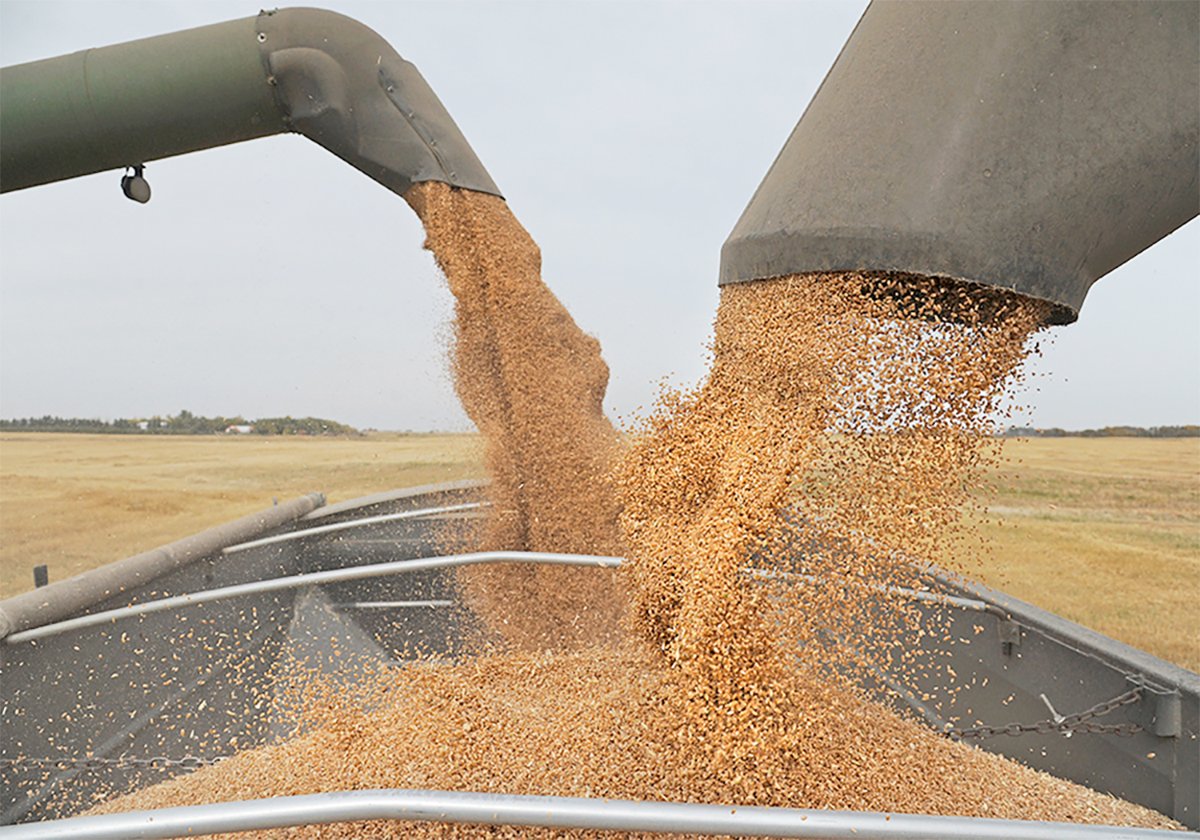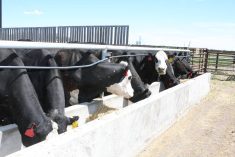Whack a mole
There is no doubt that Stephen Harper has been busy keeping a muzzle on Conservative candidates and cabinet ministers like Gerry Ritz, in a very similar fashion to the arcade game Whack-A-Mole.
Too busy, it turns out, to write or fact check his important speeches in the House of Commons or apologize to Canadians after he is discovered reading someone else’s speech into the record.
Too busy, it seems, to publish a platform document during this election campaign even though other leaders have tabled a document for public scrutiny.
Read Also

Agriculture productivity can be increased with little or no cost
There’s a way to enhance agricultural productivity with little or no cost. It doesn’t even require a bunch of legislative changes.
Relying instead on phrases like “let’s be clear,” “it’s perfectly clear,” or “clearly,” Harper cows the media and public with extra security and the ever-present RCMP.
The only thing that is clear is that Harper is laughing at Canadians as he takes them for granted.
– Ron Watson,
Lancer, Sask.
No show
For the second election in a row, incumbent Tory candidate Chris Warkentin refused to show up at a forum (Oct. 3) in Fairview, Alta., sponsored by the National Farmers Union and Council of Canadians. …. When asked about this on Sept. 24 at a forum in Grande Prairie, Mr. Warkentin replied that he had to attend an event at Brandt Tractor.
It is appalling and not democratic that Mr. Warkentin feels that he doesn’t have to participate in a discussion about agriculture, the cost of fertilizer and fuel, rail transportation, grain marketing and livestock marketing, particularly in a year where Peace country farmers have faced increased uncertainties in the livestock and grain sector due to drought and insecure markets.
This is an issue the farmers should consider when they go to the ballot box on Oct. 14.
If Chris Warkentin won’t take the time to attend a public debate, what makes you think he will take the time to give a hoot about what you have to say or questions you might have when elected?
Clearly Mr. Warkentin is more interested in socializing with corporate agriculture rather than talking to the men and women whose livelihoods are most affected by the current agriculture climate. We in the Peace country deserve better ….
– Mandy Melnyk,
Debolt, Alta.
Law and order?
The Harper government claims it is going to be tough on lawbreakers. Yet when Linda Keen, president of the Nuclear Safety Regulatory Agency, refused to be intimidated by Harper into breaking the law, he fired her.
Adrian Measner, president and chief executive officer of the Canadian Wheat Board, refused to be bullied into breaking the CWB Act. Harper fired him.
The Harper government tried twice to violate the Privacy Act and force the CWB to give them personal, confidential business information on farmers who deal with the CWB.
Harper and his ministers also broke the law in attempting to remove barley from the CWB. Twelve farmers challenged the government in court and won on both the original case and on the government’s appeal.
Harper’s public response was to threaten that those who opposed his position would get walked over. Comforting words from a law and order PM.
The Harper government violated the Charter of Rights and Freedoms by restricting the freedom of speech of CWB directors and their staff to advocate for what they believed to be true and in the best interests of farmers.
Harper government lawyers portrayed the government action as “normal government practice.” In ruling against Harper, the judge commented that it might be normal in Zimbabwe.
Two recent government actions are being challenged by farmers as being both undemocratic and illegal.
Harper has removed third party spending limits in the current CWB director election so that the big foreign corporations will be able to support CWB director candidates who will dismantle the CWB.
He is also removing close to 40 percent of the producers from the CWB voters list in the hopes of influencing the vote. Harper could set a good example for Canadians if he would look in the mirror and lock up the first lawbreaker he sees.
– Art Macklin,
Grande Prairie, Alta.
Election & CWB
In the last federal election there was no mention made by the Tories about their plans for the Canadian Wheat Board. After the election, they passed many Orders in Council for the removal of barley from the CWB and for a number of other negative changes to board operations.
In this election there will be no surprises concerning the Tories’ policies toward the CWB.
We know that the voters who fanatically oppose the CWB and support the open market will vote Tory. We know that the voters who favourably support the CWB and are suspicious of the open market will vote anything else.
The wild card is the voters in rural Western Canada who support the CWB but hate the gun registry or gay marriage or abortion or questionable taxes or any number of other issues. They may feel they need to vote Tory to address these concerns.
But one thing for sure is that after this election, if there is a Tory majority government, the gun registry, gay marriage, abortion, unfair taxes and any number of other arbitrary issues will still be the law of this land, past this election and the next.
However, the Canadian Wheat Board will not last past Aug. 1, 2009.
– Michael Cobbe,
Limerick, Sask.
Wind power
The secret of German renewables success is the feed-in tariff (FIT).
Anyone generating electricity from solar, photo voltaic, wind or hydro gets a guaranteed payment of up to four times the market rate for 20 years. This reduces the payback time on such technologies to less than 10 years and offers a return on investment of eight to nine percent. The cost is spread by generating companies among all users and has added about one cent per kwh to the average bill.
FIT has now been adopted by 19 European countries and 47 worldwide.
Take Q-Cells. The company started making silicon PV cells in East Germany in 2000 with 19 staff. It now has 1,200 and expects to have 5,000 by 2010. It is one of the fastest growing companies on the planet.
Professor E. Weber, head of the Fraunhofer Research Institute in Freiburg, says the potential for renewables backed by FIT is enormous.
He expects the 2.5 gigawatts of solar PV installed in Germany (half of the world total) to skyrocket within five to 10 years. He expects this to rise to 100-150 gigawatts.
This market is growing 40 percent a year. He says renewables are sufficiently technically advanced to meet the world’s demands for clean energy in the coming decades.
As to wind energy, the St. Albert Gazette, Feb. 16, 2008, states that Alberta gets only one percent of power from the wind.
Tim Weiss, wind turbine engineer with the Pembina Institute, said Alberta has some of the best wind resources in the world yet gets just one percent of its power from wind. This is a far cry from Germany and Denmark at 10 and 25 percent.
He said if Alberta is serious about climate change, it has to get serious about wind power. If the government does not take a leading role, very little is going to happen. Price is the main reason why wind power hasn’t taken off in Alberta.
Now, Germany, Denmark and Spain with the help of FIT are the leaders in wind power.
Alberta, wake up.
– John Plett,
Dixonville, Alta.
SPP agenda
Now that Stephen Harper is asking to be re-elected prime minister, it would be a good time for Canadians to ask him to explain what confidential issues were discussed at the secret Security and Prosperity Partnership (SPP) meetings he attended at Banff, Alta., and Montebello, Que.
In a media interview following the Montebello meeting, Harper was asked to comment on what important matters were discussed. He trivialized the question by remarking about the standardization of the quality of jellybeans.
The secret agenda of the meetings was never made public, but the term “harmonization” was occasionally used.
Would a majority Harper government negotiate the harmonization of health care, labour safety, agricultural marketing and environmental standards between the U.S., Canada and Mexico?
And what about energy and water supplies?
Was the harmonization of foreign policy and defence on the agenda? We don’t know. The meetings were closed to the public and included only the leaders of the U.S., Canada and Mexico, along with selected politicians and financial and industrial heavyweights.
And yet, Canadians have a right to know. These issues affect our quality of life and our country’s sovereignty. If the matters discussed were so innocent, why all the secrecy and security?
When politicians pander to corporations and major decisions are made surreptitiously, without public and parliamentary debate, it can no longer be called democracy.
It’s corporatism.
– William Dascavich,
Edmonton, Alta.
Ritz’s comments
I have just watched the reaction of Swift Current resident Dennis Schroh in light of the callous comments from federal Conservative agriculture minister Gerry Ritz regarding deaths of Canadians who have contracted listeriosis courtesy of Maple Leaf Foods and the Canadian Food Inspection Agency.
My sympathy goes out to Mr. Schroh and his family and the families of other Canadians who are mourning the loss of loved ones to those who fell victim to this disease under Mr. Ritz’ watch.
Mr. Schroh said he does not accept Mr. Ritz’s apology nor should he, nor should any Canadian whether directly affected by this deadly disease or not.
Mr. Ritz should have done the honourable thing after having been found out and resigned immediately as a minister of the crown.
Failing that, his boss, Stephen Harper, should have fired him on the spot.
It is inconceivable that the prime minister has turned a blind eye to this type of action and is even allowing his buddy to remain a candidate for the Conservative Party of Canada during the current, unnecessary federal election.
The Canadian electorate from coast-to-coast-to-coast needs to remember this type of indiscriminate callousness come Oct. 14 and follow Newfoundland/Labrador premier Danny Williams’ lead by voting ABC – Anything But Conservative.
– Jim Swettenham,
Winnipeg, Man.
Improve soil
In response to “GM one answer to food demand,” Opinion, Sept. 18, if genetically modified crops are designed to grow on poor soils, where is the crop’s nutritional value coming from?
Sure, the crop will have access to the building blocks of carbon, hydrogen, oxygen and nitrogen. These crops will be high in certain carbohydrates, oils or proteins.
However, these crops will be lacking the trace micronutrients, not found in poor soils.
GM crop products may have a place in the industrialized food and chemical production industry, however, they have no place as a staple food, feeding the human population.
The real solution is found by improving soil health. Healthy soils produce healthy crops, which feed healthy animals and humans.
Resources should be focused on returning nutrients to fields that were exported to urban centres.
– Garrett Osborn,
Big Beaver, Sask














